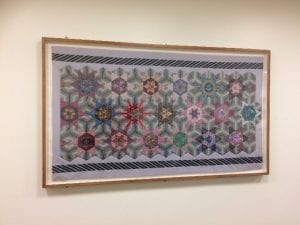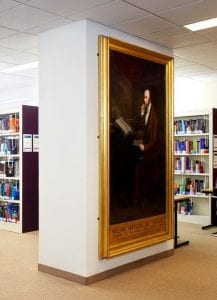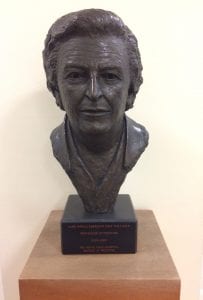Inspiration in the Library: John Horder
By ucylsjb, on 19 May 2017
In the early 1990s, Dr. John Horder (1919–2012)—pictured here—presented a patchwork quilt to the Library. It now hangs on the first floor—on the wall between Group Study Room 1 and Group Study Room 2. Horder’s sister made it, and its many constituent parts perhaps act as a metaphor for Horder’s own life. Indeed, he summarised his life as one of ‘varied experience and opportunities in parallel to each other’—rather like the quilt itself (1).

Dr. Horder was an influential general practitioner and—amongst many accomplishments too large to list—was President of the Royal College of General Practitioners from 1979–1982. He also led the editorial team that wrote the now classic textbook The Future General Practitioner – Learning and Teaching, which continues to be available at the Cruciform Library (CRUCIFORM W 89 ROY) (2).
Initially enrolled to study Classics at Oxford, the intervention of the Second World War decided Horder to pursue a career in medicine because ‘the prospect of killing fellow humans appalled’ him (2). The Times’ obituary to Horder recalls his ‘passion for the NHS,’ and perhaps fittingly, Horder sat his final medical examinations in 1948—the same year in which the NHS was founded (3). He described its establishment as a ‘welcome release’ from the ‘dilemmas about whether or not to charge at all’ and the pressure to ‘balance the losses’ (4).
Despite the conflicting demands of his busy professional life that continue to resonate in our economic and political climate, Dr. Horder was also an accomplished pianist and artist; he even chaired the Royal Free’s art committee. His own watercolour ‘A View of the College from Hyde Park’ shows an interpretation of the Royal College of General Practitioners that formed such an important part of his life. Closer to the Royal Free, his work ‘Primrose Hill‘ represents the area of London where he lived with his wife. So, the next time you walk past the quilt on the way to or from a meeting—or perhaps to the Quiet Study Area as you work towards your own dream of becoming a doctor—the quilt that may seem a little out of place in a library has a story to tell of Dr. John Horder.
Bibliography
- Horder J. An account of my life. London journal of primary care. 2008;1(1):51-4.
- Horder J. An account of my life. London journal of primary care. 2009;2(1):74-6.
- “Lives remembered: Dr John Horder.” https://www.thetimes.co.uk/article/lives-remembered-dr-john-horder-cjb6j2lgqkz (accessed May 11, 2017).
- Horder J. An account of my life. London journal of primary care. 2009;2(2):172-4.
 Close
Close



